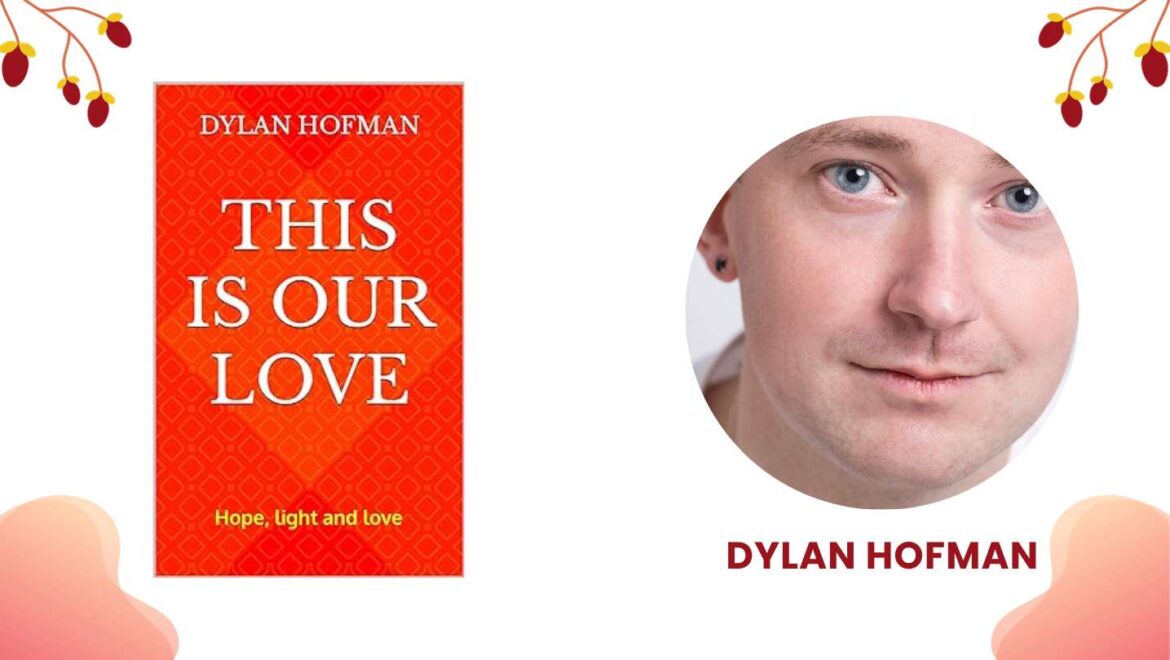Akhila Saroha: I would like to begin by congratulating you on the publication of “This is Our Love.” What were the events that led to the idea of writing it?
Dylan Hofman: I believe that disapproving of or seeking to “cure” homosexuality (an innate and harmless trait for society) in young people can lead to psychological issues. Just like eye color or skin color cannot be changed. Therefore, I try to promote this message in my own way.
Akhila Saroha: As a title, “This is Our Love” makes the readers wander at different levels about its significance and validity. Did you have any alternative titles in mind? How did you come up with this as the title?
Dylan Hofman: Originally, I had the title “Heavenly Openness” in mind because during my psychosis two years ago, I had the belief that I was being assisted by something supernatural. In the Western world, this is often viewed as something strange, whereas in India, such a spiritual experience may be seen as just that—a spiritual experience.
Akhila Saroha: How easy or difficult was it for you to decide the placement of the pace of the text and ensure that the readers would also feel connected to it in “This is Our Love”?
Dylan Hofman: I haven’t considered the pace of the text. I wrote the book all at once. I believe that when you have to truly think about every word you write, the universe has determined that you’re not yet ready to write a book. To explain this, I would like to show you the video below:
Akhila Saroha: The book breaks ground by exploring subjects that make it unique in itself. Please share about your past experiences in literary writing as well as your future plans in writing.
Dylan Hofman: The first book I wrote is titled “You can make a difference.” I wrote this book during either my psychosis or spiritual experience. Perhaps I will translate it into English someday, but it is a sensitive and painful book for me. In the future, I plan to write more books, but I don’t make specific plans for them. I write when my intuition tells me it’s okay to do so.
Akhila Saroha: Did you have any particular audience in mind while writing “This is Our Love”? Which was it?
Dylan Hofman: I believe that anyone can read the book. It offers different perspectives, and I hope it will inspire people to be more tolerant towards one another. It promotes connection by acknowledging and embracing our differences.
Akhila Saroha: “This is Our Love” has a strong significance on the personal and social levels. Was prose the first format of writing that came to your mind to give words to your expression? Would you like to try the same with poetry as well?
Dylan Hofman: I believe that the book I have written also contains poetry, and I think that these two genres can coexist seamlessly. People tend to think too much in terms of categories, which only leads to division.
Akhila Saroha: “This is Our Love” has given a powerful introduction to your potential as a writer. How was the journey of the book in the making?
Dylan Hofman: It was painful, challenging, and extremely difficult. People often assume that writing is an easy task, but I pour my entire soul into the book I write.
Akhila Saroha: “This is Our Love” also features a variety of people playing different roles. How easy or difficult was it for you to write about them and remain unbiased and not let the readers’ thoughts be influenced?
Dylan Hofman: I hope that after reading my book, readers will come to realize that connection between one another is much more important than constantly focusing on differences. However, to initiate the conversation, it is crucial to highlight and acknowledge those differences.
Akhila Saroha: “This is Our Love” features a plot that develops swiftly and still manages to keep the readers involved. How did you ensure that the readership would remain involved throughout?
Dylan Hofman: I believe that the book is easy to read because it is divided into the seven days of the week, with each day encompassing a different story. Just like in real life, each day is different. Embrace the days with love and enjoy them.
Akhila Saroha: In the present time, the ideas in “This is Our Love” do not find much mention. What, according to you, could be the possible reason for that?
Dylan Hofman: In my view, we still tend to think in terms of categories. We focus on each other’s differences, and anything that deviates from the average can lead to xenophobia. It is only when we are confronted with our own prejudices that we realize as humanity, we have far more similarities than differences.



